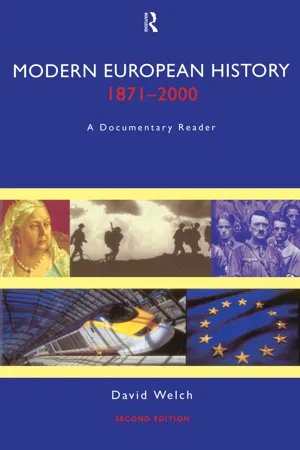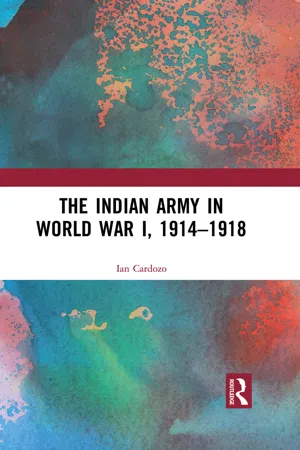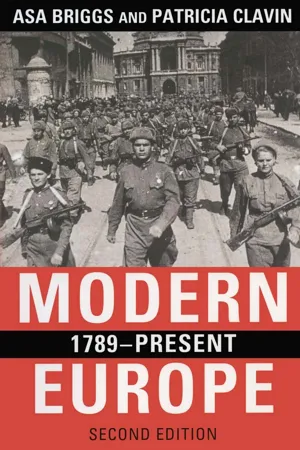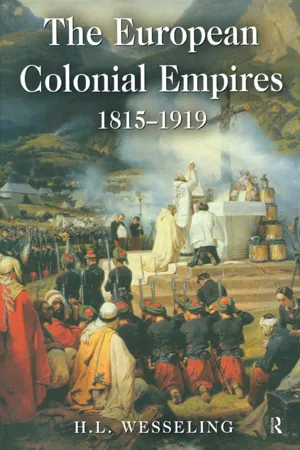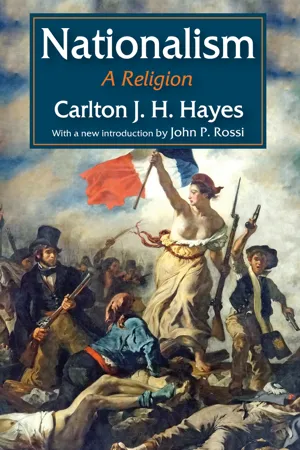Causes of First World War
The causes of the First World War can be attributed to a complex web of factors, including militarism, alliances, imperialism, and nationalism. Tensions between major powers, such as Germany, Austria-Hungary, and Russia, were exacerbated by the assassination of Archduke Franz Ferdinand of Austria, ultimately leading to the outbreak of war in 1914.
8 Key excerpts on "Causes of First World War"
- eBook - ePub
Modern European History, 1871-2000
A Documentary Reader
- David Welch(Author)
- 2020(Publication Date)
- Routledge(Publisher)
...4 The origins of the First World War and its aftermath On 28 June 1914 Archduke Franz Ferdinand, heir to the Austrian throne, was murdered in Sarajevo in Bosnia, which had been annexed by Austria in 1908. The assassin and his co-conspirators were members of a Serbian nationalist group called ‘the Black Hand’. In less than five weeks the alliance systems of the great powers had turned this local incident into a European war. The origins of the First World War are a source of major historical controversy that has refused to disappear over the years. The historiographical debate must, therefore, inform any discussion about the events that ‘triggered’ a European and then a world war in 1914. The origins of the war can be analysed in many different ways, but any attempt to explain its origins must take into account the immediate causes of the war and the long-standing reasons for instability and international tension in Europe. The list of general causes would include the colonial conflicts and the scramble for overseas possessions; the building up of new alliances and the formation of two power blocs; the escalation of the arms race; and the increasing conflicts in the Balkans. Although the documents included in the first part of this chapter are generally related to the immediate causes of the war, they are intended to illuminate some of the wider issues as well. The illusions with which the First World War began all stemmed from the belief that it would be a short, clinical and controllable war (‘It’ll all be over by Christmas’)...
- eBook - ePub
- Preston Jones(Author)
- 2013(Publication Date)
- Research & Education Association(Publisher)
...As Germany’s navy grew, for example, the British strove to maintain superiority. This international competition was partly spurred by social Darwinism. In August 1914 war broke out in Europe long after many came to believe that it was inevitable. Another cause of the war was the fact that Europe had not seen a lengthy and costly war since the final defeat of Napoleon in 1815. Prussia and France had fought a war in 1870 (the Franco-Prussian War), but it ended quickly and did not cause loss of life on a scale anywhere near what Europe would experience in the early twentieth century. Britain’s war against the Boers of South Africa was costly, but it was also far removed from Europe. This meant that, for many, war had become romanticized. In 1914 it seemed a good way for a young man to bring glory on himself, to have a good time, to be a hero. When war was declared in August 1914, middle-class young men throughout Europe enthusiastically volunteered to fight, believing that the war would be over by Christmas. At the same time, many Europeans feared that their populations were growing morally soft, that they simply enjoyed the fruits of the empires their fathers had built. A little war, many thought, would be a good way to toughen up the young. Still another very important cause of the war was nationalism in central Europe. Germany’s main ally, the Austro-Hungarian Empire, comprised not only speakers of German and Magyar (Hungarian) but also Czechs, Slovenians, and Serbs who wanted independent nations. The nation of Serbia sympathized with and assisted Serb nationalists in Austria-Hungary. This brings us to the trigger of the First World War: the assassination of the Austrian Archduke Franz Ferdinand (1863–1914) by Serbian nationalists. Austria believed that the assassins had been assisted by Serbia, and when Serbia declined to meet Austria’s demands (which essentially would have placed Serbia under Austrian control), Austria declared war on Serbia (July 28)...
- eBook - ePub
- Ian Cardozo(Author)
- 2019(Publication Date)
- Routledge(Publisher)
...Chapter 1 Causes and Events that Led to World War I: Footfalls of History Do not go to war without knowing how it ends ANONYMOUS FROM THE BEGINNING to the middle of the nineteenth century, countries in Europe maintained a balance of power that helped to keep the peace and to prevent wars involving two or more countries. Despite this effort, the growing rivalry between France and Prussia for the mastery of Europe was moving towards criticality. In July 1870 war broke out between France and Prussia. The war ended in 1871 resulting in a victory for the Prussians and the unification of Germany. By terms of the peace treaty, France had to surrender the eastern state of Alsace and much of Lorraine. This period could be considered as the start of the rise of Germany’s ambition to become a world power. It also resulted in a burning desire by France to avenge its defeat and to recover its lost territories. Around this time, the Ottoman Empire was breaking up. Turkey was considered to be the ‘Sick Man of Europe’ and became fair game for major and minor European powers to help themselves by armed force during the First and Second Balkan wars to annex large portions of the Ottoman Empire. Egypt and Cyprus went to Britain, Morocco and Tunis went to France, Tripoli (Libya) went to Italy and Bosnia-Herzegovina went to Austria-Hungary. All these events, particularly the last, resulted in putting the Balkan states in turmoil. The struggle for the Balkans, however, did not end with the cessation of hostilities. Russia, Serbia and the Hapsburgs still contended for control over the Balkans. Russia wanted dominance over the Slavs, Austria-Hungary wanted to be a bridge to the East through the Balkans, and Serbia wanted access to the sea...
- Antony Best, Jussi M. Hanhimäki, Joseph A. Maiolo, Kirsten E. Schulze(Authors)
- 2014(Publication Date)
- Routledge(Publisher)
...Still others look to miscalculation, misperception, accident, fear or simply the lust for conquest. Whatever approach they may select, scholars often examine the interaction between two sets of causes: long-term causes (or conditions) which made a war probable and the immediate causes and decisions which triggered a particular war at a particular moment. What follows is divided between a discussion of some long-term causes and then a look at how events moved to spark war in the summer of 1914. One important condition was the system of Great Power alliances and alignments. Overly rigid alliances prevented the ‘proper’ functioning of the balance of power, so the usual argument goes, and ensured that what might have been an isolated crisis in the Balkans became a general war. Certainly, from 1900 onwards, Europe was increasingly split into two coalitions: Germany and Austria-Hungary (the Central Powers) were bound by the 1879 Dual Alliance to support each other ‘with the whole strength of their empires’ if Russia attacked, and Italy joined in 1882 to form the Triple Alliance; France and Russia closed ranks in 1891–94 to counter the German–Austrian alliance, and Britain settled its imperial disputes with France in 1904 and with Russia in 1907. However, it is easy to exaggerate the point, for these alliances remained flexible enough to permit the Powers to withhold diplomatic and military support in order to exert a restraining influence on a partner, especially, as was so often the case, if no common interests were at stake. Britain remained the least committed. Italy remained neutral in 1914 and went to war on the side of the Entente Powers in 1915. Up until 1912–13, Berlin withheld its support for Austria in the Balkans and advised caution. The real importance of the alliance system was the way in which the alliances and alignments were transformed into something very different from what their makers had intended...
- eBook - ePub
The First Age of Industrial Globalization
An International History 1815-1918
- Maartje Abbenhuis, Gordon Morrell(Authors)
- 2019(Publication Date)
- Bloomsbury Academic(Publisher)
...Dealing with these challenges as a collective multilateral enterprise became increasingly difficult. After all, the disadvantages facing one industrial empire surely presented an advantage or opportunity for another when they competed for the same share of the international pie? The history of the origins of the First World War is often written as a ‘path to war’ story in which the growing competition and rivalry between the Europe an great powers in the decades leading up to 1914 offer a convincing explanation for the outbreak of the war. 4 At times, such histories even become teleological and describe the war as an inevitable outcome of imperial competition. This was, for example, Vladimir Lenin’s thesis in his 1917 treatise Imperialism: The Highest Form of Capitalism, in which he argued that since there was nothing left for the industrial great powers to conquer by 1900, their economic competition increasingly became acrimonious resulting in inevitable warfare between them. 5 Later historians have posited alternate versions of the ‘inevitable war’ thesis, many of which present a case for any one of the five European great powers’ willingness to provoke a system-breaking conflict...
- eBook - ePub
- Asa Briggs, Patricia Clavin(Authors)
- 2014(Publication Date)
- Routledge(Publisher)
...Chapter 4 RIVALRY AND INTERDEPENDENCE, 1871–1914 ___________ ‘THE CAUSES OF WAR’ A s was fully revealed during the 1870s, there were many contradictory forces inside and outside Europe during the 43 years of European hegemony that separated the founding of the German Empire in 1871 from the outbreak of the First World War in 1914, a European war that became a world war. It was fashionable, indeed, during and after that war to look back and identify these contradictory forces, domestic and international, as ‘causes’ of the war, distributing blame. More recently the word ‘fuse’ has replaced ‘causes’, with one American historian, Laurence Lafore, writing of the war’s ‘long fuse’. 1 Just as the period began, Disraeli predicted what the future might be like when he told Parliament in 1871 that the war between France and Germany was ‘no common war like the Crimean War, the Italian War or the Austro-Prussian War. It represented a greater political event than the French Revolution last century’, adding percipiently that he did not say ‘a greater or a great, social event’. ‘You have a new world, new influences at work, and unknown objects and dangers with which to cope.’ One identifiable force in the ‘new world’ around the turn of the century, militarism, was not new. It had never been confined to one country or group of countries, and in some places it had the force of a religion. Now it was intensified, and Disraeli’s great opponent, Gladstone, saw it as the biggest danger in an unpredictable future. (Plutocracy, the role of wealth, was for him another). Militarists strutted. Brightly uniformed men on horseback were proud of their rank and of their code of honour, but most ominously they were proud too of their weaponry. It was placed on display not only on parades but at international exhibitions...
- eBook - ePub
The European Colonial Empires
1815-1919
- H. L. Wesseling(Author)
- 2015(Publication Date)
- Routledge(Publisher)
...CHAPTER 7 The First World War and the colonies A war is a crisis of the natural rivalry between peoples. Jules Lemaître Imperialism and the origins of the First World War I mperialism led to numerous tensions, not all of which were dangerous. The Anglo-French dispute over Siam was solved rather easily. This was also true of the international perils arising from the Congo question. England did not at first understand Germany’s ambitions in Southwest Africa, but later accepted them without difficulty. The race between the French and the British in West Africa had the potential to develop into a dangerous conflict, but this problem was eventually solved relatively easily in 1898. The Fashoda Crisis of that same year was much more dangerous. Here was a serious diplomatic conflict that could possibly have led to an Anglo-French war. The power relations were so much to France’s disadvantage, however, that it had no choice but to yield. Shortly thereafter, the Boer War began, which – although it led to great international tension and fierce criticism of Great Britain – ultimately remained a local conflict, the outcome of which was certain from the start. The Morocco crises The situation in Morocco was very different indeed. This affair not only involved the most important of the great powers but also became a matter of international politics at large, exerting an influence on European power relations. In the Morocco question, France found itself in conflict with its great continental opponent, Germany (a consequence of Germany’s worldwide political ambitions), and supported by its classical colonial rival, Britain (a result of Anglo-French reconciliation, which had led to the Entente Cordiale). The Entente Cordiale of 1904 was rooted in the changes that had taken place in French as well as British diplomatic policy...
- eBook - ePub
Nationalism
A Religion
- Frans A.M. Alting von Geusau, Frans A.M. Alting von Geusau(Authors)
- 2017(Publication Date)
- Routledge(Publisher)
...9 Nationalism, Cause and Result of World War I 1. National Versus Imperial States in Eastern Europe By the start of the present century, progress had been made in redrawing the political map of Europe along lines of nationality. In addition to the older national states on the Atlantic seaboard, there were now national states in central Europe for Italians and Germans and in the southeast for Greeks, Serbs, Rumanians, and Bulgarians. In other words, national states had become the prevalent form of government throughout full half of the Continent. These, as I have pointed out in the preceding chapter, might not include the whole of a nationality, and in fact they might contain some dissentient national minorities, but each had as its core and dominant majority a people with distinctive speech and traditions. The situation in most of eastern Europe was different and equivocal. Here were a large number of nationalities, with intensifying cultural nationalism, but without national states of their own and subjected to one or another of three surviving empires—the Russian, the Ottoman, or the Austrian. The Russian Empire was an approximation to the national states of western Europe in that a single nationality (the “Great Russian”) constituted a majority of its inhabitants and shared a common patriotism. Nevertheless its subject nationalities, especially those in the Empire’s western provinces and in the Caucasus, resented the “Russification” applied by the Tsar’s government, and their leaders could be counted upon to sympathize and cooperate with revolutionary movements aimed against the autocratic imperial regime. The Austrian Empire, or, as it was now officially called, the Dual Monarchy of Austria-Hungary, was an outstanding example, in east-central Europe, of the imperial, nonnational state. It contained a hodgepodge of nationalities...
